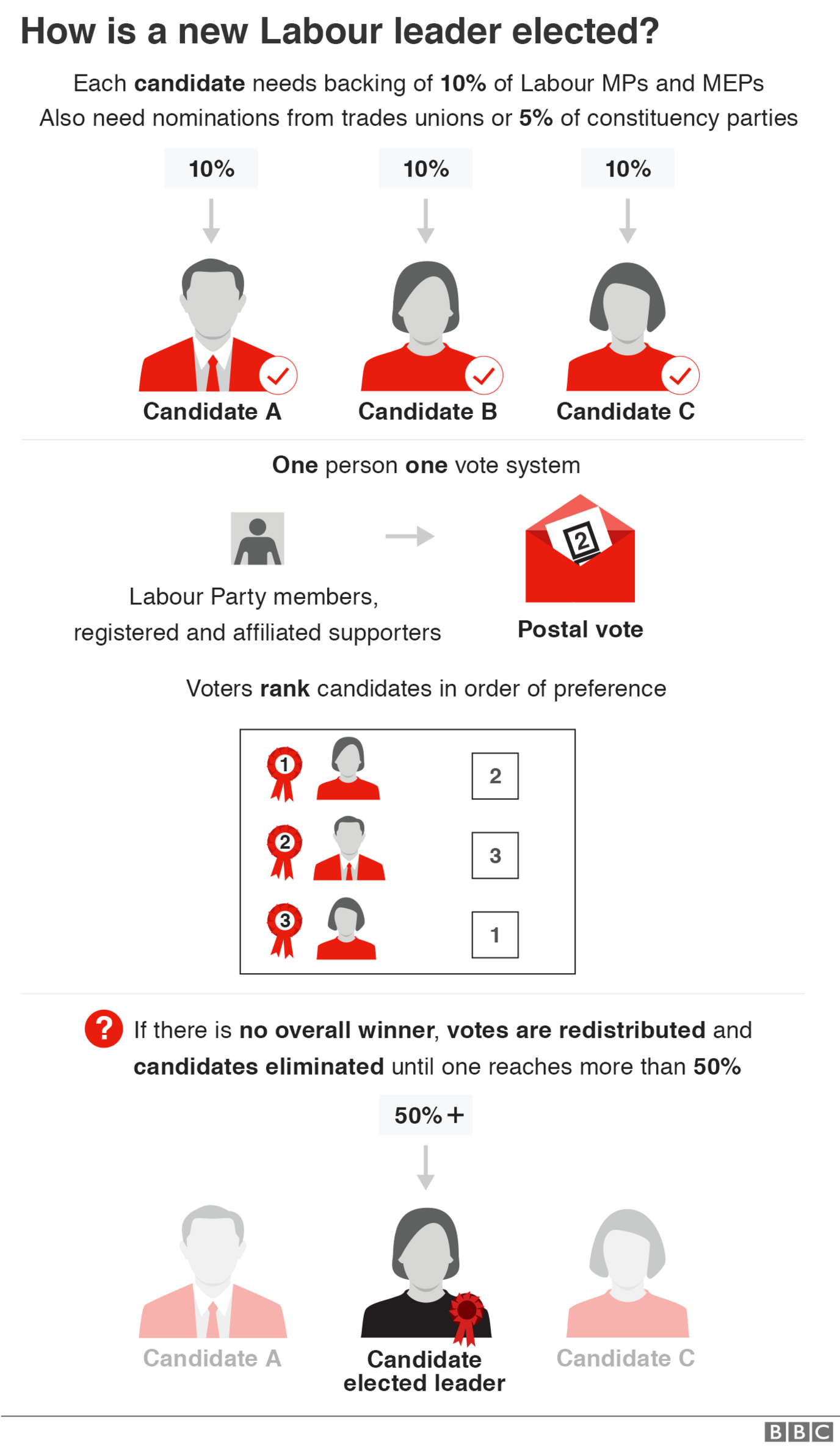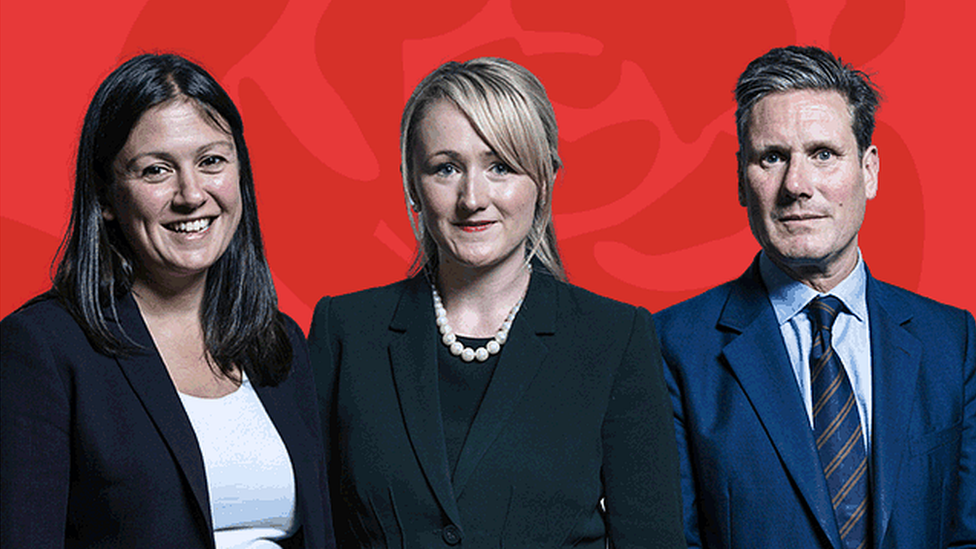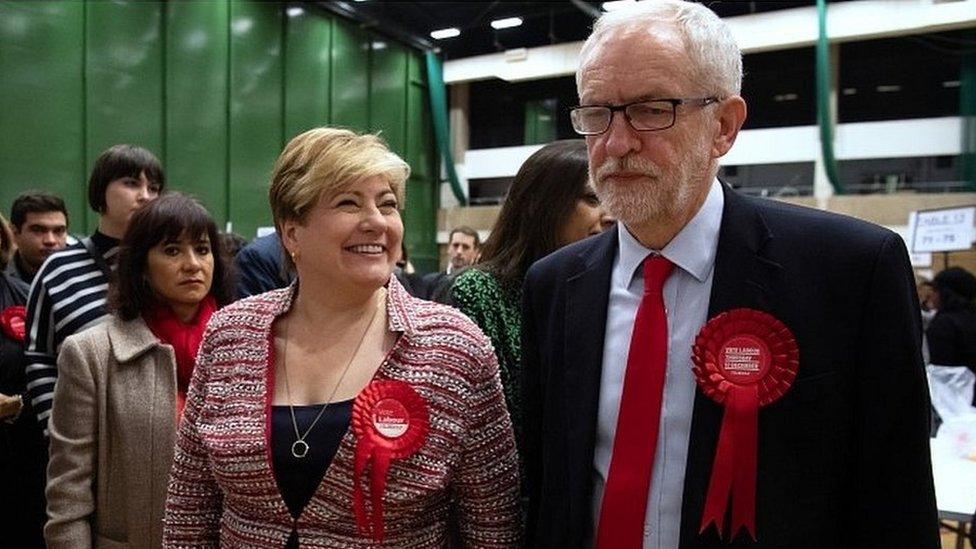General election 2019: Blair attacks Corbyn's 'comic indecision' on Brexit
- Published
- comments
Tony Blair: "Election result brought shame on us"
Labour "pursued a path of almost comic indecision" over Brexit during the election and "alienated both sides of the debate", Tony Blair has said.
In a speech in London, the ex-PM said he believed the party could have kept much of the vote in traditional Labour areas under a different leadership.
The situation was "made impossible by failure to take a clear position and to stick to it", Mr Blair said.
"The result has brought shame on us. We let our country down," he added.
In an interview with the BBC's Newsnight, Mr Blair said "the Labour Party, by its self-indulgence - and that's what it was in the end - was the effective handmaiden of Brexit.
"It's not our fault, because the fault is with those who advocated it - but our combination of misguided ideology and utter incompetence allowed it to happen."
Jeremy Corbyn told MPs on Tuesday that he "took responsibility" for Labour's worst electoral performance, in terms of seats won, since 1935.
And some of his supporters within the party, including shadow justice secretary Richard Burgon, have called Mr Blair's comments an "oversimplification" and said Mr Corbyn should not be blamed for the loss.
'Without shame'
Labour's leader in Wales, and First Minister, Mark Drakeford, said there was "nothing wrong" with the party's "basic message" and it just had to be "retuned" in five years' time.
Mr Corbyn has said he will stand down as Labour leader "early next year".
But he was criticised to his face by some Labour colleagues, with former MP Mary Creagh saying the lack of a personal apology showed he was a "man without honour and without shame".
Meanwhile, Emily Thornberry has become the first MP to officially put herself forward to replace Mr Corbyn as Labour leader.
In an article for the Guardian, external, she said she has already "pummelled" Boris Johnson across the despatch box and said she would be able to exploit the prime minister's failings.
Mary Creagh on Jeremy Corbyn: "He should be apologising"
In his speech, ex-Labour leader Mr Blair - a longstanding critic of the party's move to the left under Mr Corbyn - said: "I believe with different leadership we would have kept much of our vote in traditional Labour areas.
"Instead, we pursued a path of almost comic indecision - alienated both sides of the debate."
And he said the party should never have fallen into the "Elephant trap" of agreeing to a "Brexit election" without a clear position on Brexit and with a leader who had a "net approval rating of minus 40%".


Mr Blair knows his intervention will probably be dismissed by many in the Labour Party, and he will be reviled by Corbynites.
But what, I think, he is trying to do is open a genuine debate, in the aftermath of Labour's worst defeat since 1935.
His analysis is the scale of the defeat now threatens the very future and survival of the Labour Party - that under Mr Corbyn it has travelled so far from electability that if it carries on on that trajectory it will never be returned to government and it will be replaced by another force, another party.
So his analysis is a pretty stark one: Either the party claws back from the Corbyn agenda - or it's over.

Labour fought the 2017 general election on a platform of leaving the EU.
But it switched to backing another referendum, under pressure from its members and senior figures in the shadow cabinet.
During this year's election campaign, Mr Corbyn said he wanted renegotiate a Brexit deal with the EU and then put it to a public vote, with the option of remaining in the EU.
But he said he would not take sides during the referendum campaign, and would act instead as an "honest broker" who could unite the Leave and Remain factions.
Mr Blair said "it would have been better" if Mr Corbyn had just said he was pro-Brexit, in line with his longstanding Euroscepticism.
"When things are really tough in politics, you might as well do what you believe in, because at least you'll be more convincing defending it," he said.
Mr Blair insisted his criticism of Mr Corbyn as leader was not an attack on him "as a person".
But he added: "People saw him as fundamentally opposing what Britain and Western countries stand for."
Mr Corbyn personified "a brand of quasi-revolutionary socialism - mixing far-left economic policy with deep hostility to Western foreign policy" - and that this combination "never has and never will" appeal to traditional Labour voters, he argued.
And the far-left "protest movement" which was born out of Mr Corbyn's leadership was supported by "cult trimmings" and was "utterly incapable" of being voted in as a "credible government".
'Oversimplification'
Turning to allegations of anti-Semitism in Labour, Mr Blair said: "The failure to deal with it is a matter of disgust that left some of us who voted Labour feeling for the first time in our lives conflicted about doing it."
He also hit back at Mr Corbyn's claim that Labour's policies were popular, arguing that individual policies, such as renationalising the railways, may have been popular but taken together, the party's manifesto was a "100-page wish list".
"Any fool can promise everything for free - but the people weren't fooled," he added.
Mr Blair, won three general elections in a row between 1997 and 2005, said Labour's challenge was to become a "modern progressive coalition" with the ability to win and hold power or admit it had "exhausted its original mission".
He did not support the idea that the next Labour leader had to be a woman or come from outside London, as some in the party have suggested.
"What (the public) want is someone who is going to govern the country with a creditable programme," he told the audience.
'Oversimplification'
Among the Labour seats in the North of England to fall to the Conservatives was Mr Blair's former constituency Sedgefield, which he represented for 24 years, and which has not had a Tory MP since the 1930s.
But Shadow Justice Secretary Mr Burgon insisted Labour's election defeat should not be blamed on Mr Corbyn.
He told BBC Politics Live: "I think it's a mistake to put everything down to a single leader or personality."
He blamed the "the right-wing press" for trying to "toxify" Mr Corbyn and said that the "mistake" Labour made "was underestimating how much people wanted to get Brexit done".
Mr Burgon said Mr Blair's analysis was an "oversimplification", saying: "Does he really think that Emily Thornberry and Keir Starmer are 'hard left'?"
Sam Tarry, Labour's new MP for Ilford South, said: "It's very easy for Blair to come out with these simplistic sort of problems.
"It's under his regime that we really began to break down the trust in the electorate."
'Mountain to climb'
Meanwhile, shadow Brexit secretary Sir Keir Starmer has told the BBC he is "seriously considering" standing to be the next Labour leader.
He said the party had a "mountain to climb" following their election defeat.
Reflecting on Labour's election defeat, Sir Keir - who like Mr Blair backed another EU referendum - told BBC Radio 4's Today programme the party had failed to "knock back" the Conservatives' "get Brexit done" slogan.
Former Work and Pensions secretary Yvette Cooper said she would "decide over Christmas" on whether she would stand, saying the party needed to tackle anti-Semitism, restore "kindness to our politics" and be more "inclusive".
Labour ended up with 59 fewer MPs than two years ago. Its share of the vote, at 32.2%, was higher than in either its 2010 or 2015 defeats, it was a long way from the 41.9% it secured under Mr Corbyn in 2017.
Other candidates believed to be considering running to be Labour leader include:
Tottenham MP and ex-Business Minister David Lammy
MP for Norwich South and ex-shadow Treasury minister Clive Lewis
MP for Birmingham Yardley Jess Phillips
Wigan MP and former shadow environment secretary Lisa Nandy


- Published18 February 2020

- Published19 December 2019

- Published17 December 2019
- Published15 December 2019
